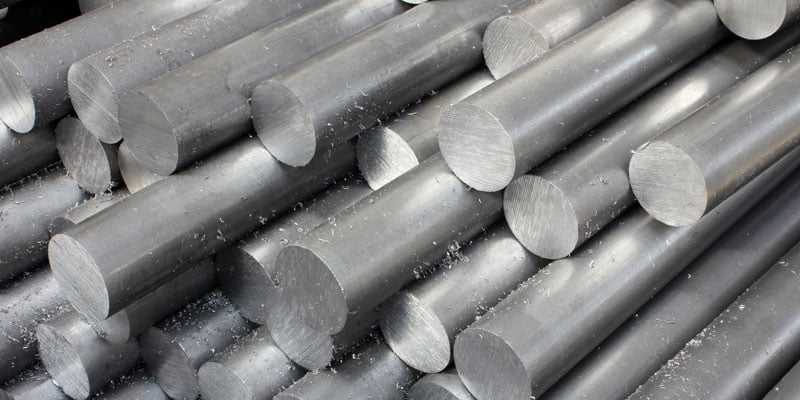In the realm of construction, manufacturing, and various industries, the choice of materials can significantly impact the outcome of a project. Steel round bars, known for their remarkable strength and versatility, often find themselves in competition with other materials. This comprehensive guide aims to dissect the characteristics of steel round bars and compare them to alternative materials, shedding light on why steel round bars remain a popular choice across diverse applications.
Introduction
Materials selection is a critical aspect of any project, whether it’s building a structure, fabricating machinery, or creating artwork. The decision hinges on factors such as strength, durability, corrosion resistance, cost-effectiveness, and suitability for specific conditions. Steel round bars have earned their reputation as dependable materials, but how do they stack up against other contenders?
Steel Round Bars: A Closer Look
 Before diving into comparisons, let’s understand what steel round bars bring to the table:
Before diving into comparisons, let’s understand what steel round bars bring to the table:
Strength: Steel round bars exhibit exceptional tensile and compressive strength, making them suitable for load-bearing applications.
Versatility: Available in various grades, steel round bars can meet specific requirements, whether for general purposes, high-stress applications, or environments demanding corrosion resistance.
Durability: Steel’s inherent durability ensures a long service life, reducing maintenance and replacement costs.
Cost-Effectiveness: Steel round bars offer a favorable balance between cost and performance, making them economical choices for many projects.
Comparing Steel Round Bars to Other Materials
Now, let’s explore how steel round bars fare when pitted against alternative materials commonly encountered in industrial and construction settings.
Steel Round Bars vs. Aluminum
Strength: While aluminum has respectable strength, steel round bars outclass it in terms of tensile and compressive strength. Steel is the preferred choice for heavy-duty applications.
Weight: Aluminum is significantly lighter than steel, making it ideal for situations where weight is a concern, such as aerospace applications.
Corrosion Resistance: Aluminum has natural corrosion resistance due to its oxide layer, but stainless steel round bars are even more resilient in corrosive environments.
Cost: Steel round bars are generally more cost-effective than aluminum, especially when considering their strength-to-weight ratio.
Steel Round Bars vs. Stainless Steel
Strength: Stainless steel round bars are known for their strength and corrosion resistance, often surpassing carbon steel in this regard.
Corrosion Resistance: Stainless steel’s primary advantage is its exceptional resistance to corrosion, making it the material of choice for environments exposed to moisture and chemicals.
Aesthetics: Stainless steel boasts a polished, corrosion-resistant surface, making it suitable for architectural and decorative applications.
Cost: Stainless steel round bars tend to be more expensive than carbon steel due to their added alloying elements.
Steel Round Bars vs. Carbon Fiber
Strength: Carbon fiber is incredibly strong for its weight, but steel round bars still hold the advantage in terms of overall strength.
Weight: Carbon fiber is exceptionally lightweight, making it ideal for applications where weight reduction is critical, such as automotive and aerospace.
Corrosion Resistance: Carbon fiber doesn’t corrode, but it can be vulnerable to UV radiation, which steel round bars are immune to.
Cost: Carbon fiber is typically more expensive than steel, but its unique properties can justify the cost in certain applications.
Steel Round Bars vs. Wood
 Strength: Steel round bars far surpass wood in terms of strength, making them essential for load-bearing structures.
Strength: Steel round bars far surpass wood in terms of strength, making them essential for load-bearing structures.
Versatility: Wood can be easily shaped and customized, but steel round bars can also be fabricated to suit various designs.
Durability: Steel is far more durable and long-lasting than wood, which is susceptible to rot, pests, and weathering.
Cost: In the short term, wood may be cheaper, but steel’s longevity often results in lower lifetime costs.
Steel Round Bars vs. Plastic
Strength: Steel round bars offer significantly higher strength than plastic materials, making them crucial for applications requiring robustness.
Corrosion Resistance: Plastic is highly resistant to corrosion, but steel round bars can outlast plastic in harsh conditions.
Weight: Plastic is much lighter than steel, which can be advantageous in weight-sensitive applications.
Cost: Inexpensive plastic may have a lower upfront cost, but steel’s durability can lead to cost savings over time.
FAQ
Q1: Are steel round bars always the best choice?
No, the best material choice depends on the specific project requirements. While steel round bars are versatile and robust, other materials may excel in certain aspects, such as weight or corrosion resistance.
Q2: Can steel round bars be used in environments with high corrosion risk?
Yes, stainless steel round bars are particularly suited for environments with a high risk of corrosion due to their excellent corrosion resistance.
Q3: What factors should I consider when choosing between steel round bars and other materials?
Consider factors such as strength, weight, corrosion resistance, cost, and the specific needs of your project when choosing between steel round bars and alternative materials.
Q4: Is carbon fiber always a better choice when weight is a concern?
Not necessarily. While carbon fiber is exceptionally lightweight, steel round bars can still be suitable in weight-sensitive applications where their strength outweighs the weight factor.
Q5: Are there hybrid materials that combine the benefits of steel and other materials?
Yes, composite materials can combine the strengths of various materials to create hybrid solutions tailored to specific applications, offering a balance between strength, weight, and other properties.
